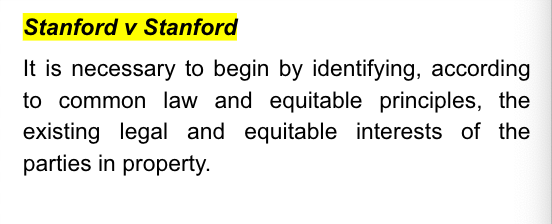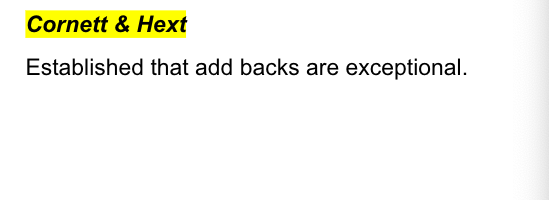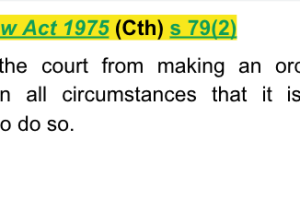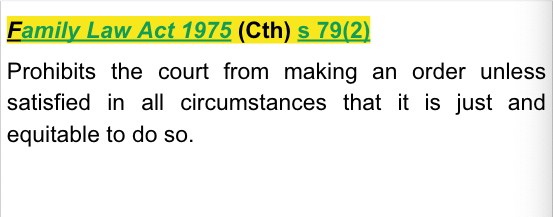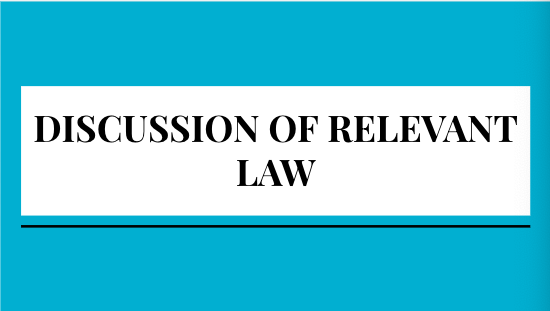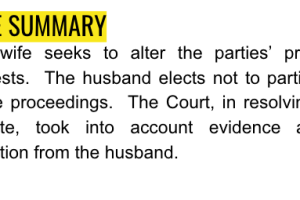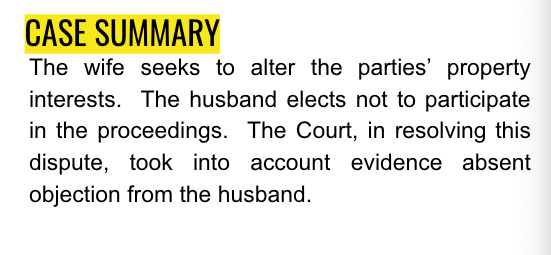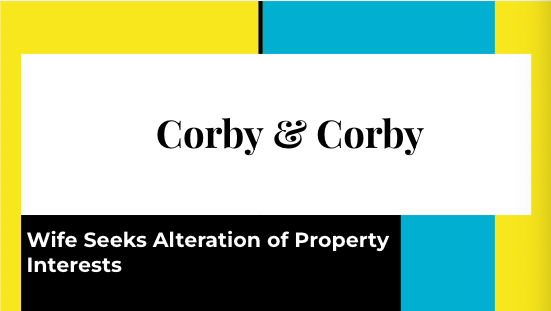- · 4776 friends
Wife Seeks Alteration of Property Interests

Case: Corby & Corby [2022] FedCFamC2F 1475 (15 November 2022)
The wife seeks to alter the parties’ property interests. The husband elects not to participate in the proceedings. The Court, in resolving this dispute, took into account evidence absent objection from the husband.

Facts:
Ms Corby and Mr Corby commenced cohabitation in 1997, were married in 2001 and finally separated in October 2017. They were previously separated for a period of 9 months in 2008. They have three children, Mr H, born in 1998, Mr J, born in 2000, Mr K, born in 2002 and X, born in 2005. The children are now aged 24, 22, 20 and 17 years respectively.
Ms Corby broadly seeks orders providing for the distribution of the value of the parties’ non-superannuation assets in the proportions of 70% to her and 30% to Mr Corby through the distribution of the sale proceeds of the parties’ former matrimonial home. She also seeks a superannuation split from Mr Corby’s interest in the Super Fund E fund of $32,500. Although Mr Corby has filed a Response, he therein seeks no orders. When asked by the Court to identify the orders that he sought, he was neither able to point to them in a document, nor articulate what they were.
He declined multiple opportunities to participate in the hearing having read a statement in which he appeared to contend that he is not subject to the Court’s jurisdiction. He appears to suggest that what he contends to be a prior agreement between the parties to equally distribute the proceeds of sale of the former matrimonial home, should be upheld. Mr Corby did not avail himself of a further opportunity at the conclusion of the hearing to make any further submissions.

Issue:
Whether or not the conduct of the husband had a discernible impact upon the contributions of the wife.

Applicable law:
Family Law Act 1975 (Cth) s 79(2) - prohibits the court from making an order unless satisfied in all circumstances that it is just and equitable to do so.
Cornett & Hext (2021) FLC 94-067 - established that add backs are exceptional.
Analysis:
Ms Corby sought to “addback” to the assets available for distribution, cash withdrawn by Mr Corby totalling $97,370 from August 2020 until December 2021. Those funds were withdrawn from the account into which his wages were being paid. The evidence does not establish that the funds existed at the time of separation. It is well established that addbacks are exceptional.
Ms Corby contends that the parties had a joint interest in a collection of silver and gold which she estimates to be valued at $60,000. However, her evidence is that she believed Mr Corby “may have sold” the collection due to his representations to her. That evidence is inconsistent with her establishing on the balance of probabilities that Mr Corby still owns or possesses the collection. When the issue was raised with her counsel, it was submitted that the value of the collection could be added-back to the value of the parties’ other interests in property.
Any disposal of the collection comprises a premature distribution of matrimonial assets which is a recognised category of an addback. The parties are both members and trustees of the Super Fund G self-managed superannuation fund. Ms Corby contended that the fund should be valued at $200,000. No financial returns for the fund are available after 30 June 2016. Ms Corby’s estimate of the increased value in the fund is entirely speculative.
Conclusion:
The Wife should have the sole conduct of the sale of the property situated at and known as B Street, Suburb C (“the B Street, Suburb C property”), including but not limited to appointing the selling agent and conveyancer and nominating the terms and conditions of sale including but not limited to determining the reserve price for the B Street, Suburb C property.



